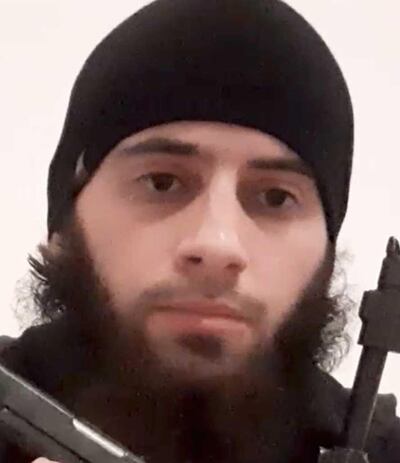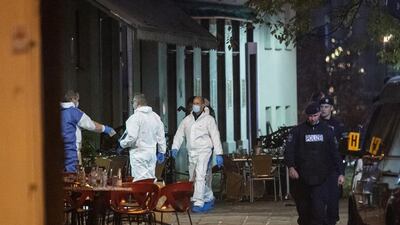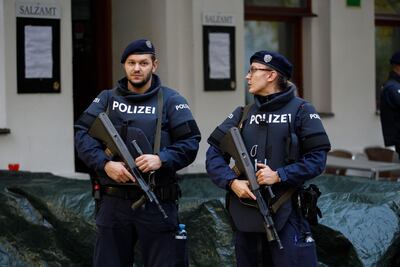ISIS claimed responsibility for Monday's deadly shooting rampage in Vienna as Austria's interior minister called for an inquiry into 'missed' opportunities by its homeland security service.
At least four people died and 22 more were wounded when the convicted 20-year-old ISIS sympathiser opened fire at about 8pm on Austria’s last night before lockdown.
He was shot dead by police following the 20 minute rampage as officers later arrested 14 others in sweeping raids across the country.

On Wednesday, Interior Minister Karl Nehammer revealed there had been a problem with Austria's handling of information provided by Slovakia after the attacker attempted to buy ammunition in the neighbouring country.
Slovakian intelligence revealed they had told their Austrian counterparts in July.
“Something apparently went wrong with the communication in the next steps,” Mr Nehammer said.
He is calling for an independent commission to look into the work of Austria's domestic intelligence agency to investigate why the crucial information was not acted upon.
Police in Slovakia said they had received information during the summer about “suspected persons from Austria” trying to buy ammunition.
“They failed to make the purchase,” they said. “We immediately sent the information to our Austrian colleagues.”
Austrian public security director Franz Ruf said intelligence officials received the information and asked questions of their Slovak counterparts but said it is unclear “whether the process went optimally.”
Questions have already been raised over why the security services were not monitoring the attacker, who has been identified as Kujtim Fejzulai.
Fejzulai, a dual citizen of Austria and North Macedonia, had been jailed in April 2019 for trying to travel to Syria to join ISIS.
He was released early from his 22-month sentence last December after “fooling” his way through a deradicalisation programme.
When he carried out the attack he was heavily armed and wearing a fake suicide vest.
The authorities said on Wednesday that video evidence has confirmed he acted alone.
On Tuesday night, ISIS, which has claimed numerous attacks in Europe, said a “soldier of the caliphate” was responsible for the Vienna attack, according to its Amaq News Agency.
The propaganda arm also published a photo and a video purporting to show the gunman.
The picture, released on the messaging app Telegram, showed a bearded man identified as “Abu Dagnah Al Albany”.
Albany carries a pistol, a machine gun and a machete and is wearing a ring stamped with a sentence saying “Mohammed is the messenger of Allah”.
Amaq posted a video of Albany minutes later in which he pledged allegiance to ISIS leader Abu Ibrahim Al Hashemi Al Quraishi.
Albany would normally be used to refer to someone with Albanian origins. The statement did not identify the man by any other name.
ISIS provided no evidence to back up its claims.
It was also unclear whether the group directly ordered Fejzulai to carry out the attack.
Security expert Matteo Pugliese, from the University of Barcelona, told The National on Tuesday that ISIS had made a rallying call to its followers to commit attacks on Europe using its latest social media platforms.
But he said it was too early to say what had motivated the Vienna attacker.
“He was very young and it’s more likely he was radicalised online or with some peers. He probably was fascinated by ISIS digital propaganda. For sure, he didn’t do this completely alone – he had some logistics support for weapons,” he said.
“ISIS recently asked its followers to carry out attacks in Europe, but it seems this terrorist decided to take action autonomously and to pledge allegiance to ISIS just before the attack.
“The attacker was among at least 90 individuals stopped by the authorities from travelling to Syria.”
Fejzulai was born in Vienna but had dual Austrian and North Macedonian citizenship.
In an interview with North Macedonia’s Klan Macedonia TV, a man identified as Fejzulai’s grandfather said his grandson visited the tiny mountainous village of Cellopek every year.
An Islamic cleric from the village, Nuri Ganii, said: “I know his family and here everyone speaks well about the family ... only today we have learned that a person [from that family] was involved in terrorism.
“I want to say that terrorism has no link to Islam.”
Another villager, Fadil Limany, said: “I only know good things of his parents and his family.
“He was born there and lived there [in Austria] ... he is from a good family. How it came to his mind I don’t know.”
Meanwhile, Austrian chancellor Sebastian Kurz urged European nations to take more decisive action against terrorism.
He called on the EU to fight "political Islam", saying it was an ideology that represented a danger to the model of the European way of life, in an interview published in Germany's Die Welt newspaper.
Interior Minister Karl Nehammer said Monday’s attack was “home-grown terrorism” and that authorities were not expecting it.
He said the attacker had duped supervisors on a deradicalisation course.
“The perpetrator managed to fool the deradicalisation programme of the justice system, to fool the people in it, and to get an early release through this,” he said.



























